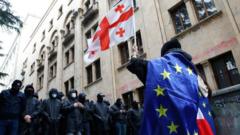Georgians have been protesting in their tens of thousands against a law on “foreign agents” passed today by the Georgian Dream governing party.
The law requires non-governmental organisations (NGOs) and independent media to register as organisations “bearing the interests of a foreign power” if they receive more than 20% of their funding from foreign donors.
Receiving such a label would mean they could be monitored by the authorities, be forced to share sensitive information or face hefty fines.
The law has been dubbed the “Russian law” because it resembles legislation that was passed in Russia in 2012, and which the Russian government has since used to silence voices challenging the Kremlin, including media organisations and prominent personalities.
Georgia is on course to become an EU member country – something 80% of Georgians support. But the EU has warned that the “foreign agents” law could be a “serious obstacle” to membership.
So Georgians see their country at a crossroads: on one side is Russia – their former ruler in Soviet times – and on the other is the European Union.
Looking out at the sea of blue EU flags that have taken over the central squares and avenues of Georgia in recent weeks, the people’s preference seems clear.
